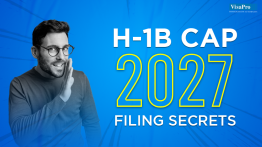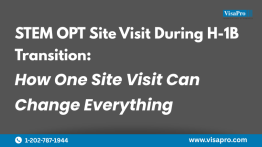Here are four urgent developments in U.S. immigration policy you need to know now, each with real implications for employers and visa holders:
1. Trump Announces $100,000 H-1B Visa Fee Rule
On September 19, 2025, President Trump signed a proclamation that, mandates a $100,000 application fee for new H-1B visa petitions.
On Oct 20, 2025, USCIS issued updated guidance on who pays the $100,000 fee for new H-1B visa applications, how to pay the fee and how to apply for an exception – https://www.uscis.gov/working-in-the-united-states/h-1b-specialty-occupations
Here are the key updates from USCIS:
A. The $100,000 fee is applicable to new H-1B petitions filed on or after 12:01 a.m. EDT, Sept. 21, 2025, for beneficiaries
1. who are outside the U.S. and do not hold a valid H-1B visa;
2. who are inside the U.S. and the petition requests consular notification, port of entry notification, or pre-flight inspection [as opposed to a request for a change of status, extension or amendment within the U.S.]; or
3. who are inside the U.S. and the petition requests a change of status within the U.S., but was approved by USCIS with a determination that the alien is ineligible for a change of status or an amendment or extension of stay
B. The $100,000 fee is not applicable to
1. any previously issued and currently valid H-1B visa holders
2. any petitions submitted prior to 12:01 a.m. eastern daylight time on September 21, 2025
3. any petitions filed at or after 12:01 a.m. eastern daylight time on September 21, 2025, that is requesting an amendment, change of status, or extension of stay for an alien inside the United States and approved accordingly by USCIS. Such beneficiaries will also not considered to be subject to the $100,000 fee if he or she subsequently departs the United States and applies for a visa based on the approved petition and/or seeks to re-enter the United States on a current H-1B visa.
C. The Proclamation also does not prevent any holder of a current H-1B visa, or any beneficiary following petition approval as above, from traveling in and out of the United States.
D.Paying the $100,000 Fee:
1. For petitions subject to the $100,000 Fee,
- The $100,000 payment must be submitted via Pay.gov.
- The payment must be made prior to filing the petition with USCIS
2. At the time of filing the H-1B petition, Petitioners must submit
- proof that the payment has been scheduled from pay.gov OR
- evidence that an exception from the $100,000 payment from the Secretary of Homeland Security at the time of filing the H-1B petition has been granted.
E. Petitions that are subject to the $100,000 payment and filed without a copy of the proof of the payment from pay.gov or evidence of an exception from the Secretary of Homeland Security may be denied.
F. Applying for an “exception”
1. Petitioning employers who believe the beneficiary satisfies the requirements for an exemption should seek an exception by sending their request and all supporting evidence to H1BExceptions@hq.dhs.gov.
2. Exceptions to the $100,000 payment are granted by the Secretary of Homeland Security in the extraordinarily rare circumstance where the Secretary has determined that
- the beneficiary’s presence in the United States as an H-1B worker is in the national interest,
- that no American worker is available to fill the role,
- that the alien worker does not pose a threat to the security or welfare of the United States, and
- that requiring the petitioning employer to make the payment on the alien’s behalf would significantly undermine the interests of the United States.
2. Weighted Selection Process for Cap-Subject H-1B Petitions
USCIS has introduced a weighted lottery mechanism for H-1B cap petitions that will favor higher wage levels, advanced degrees, and more “desirable” profiles.
- Rather than a uniform random draw, registrations will be weighted based on defined metrics.
- The goal is to prioritize petitions more closely aligned with high-skilled intent.
- This significantly alters the odds dynamic for many applicants.
3. DOL Launches “Project Firewall”
The Department of Labor (DOL) has formalized an enforcement program named Project Firewall targeting H-1B program abuses.
- The DOL intends to personally certify investigations, marking a stronger direct oversight role.
- Potential consequences include back wages, civil penalties, and debarment from future H-1B use.
- This initiative will operate in coordination with DOJ, USCIS, and EEOC, signaling high-level enforcement.
4. U.S. Reverses Visa Interview Waiver Program – What’s Changing?
The U.S. Department of State has announced that effective September 2, 2025, interview waivers for most nonimmigrant visa categories will be curtailed or eliminated.
- Applicants of all ages, including minors under 14 and adults over 79, will generally require in-person interviews, with very narrow exceptions.
- Limited waivers may remain only for a few categories (e.g. diplomatic, official, or narrow B-1/B-2 renewals) under strict conditions.
- This change is global, not limited to one country, and will likely cause longer wait times and backlogs at consulates worldwide.
Why This Matters Now
With $100K fees, weighted lotteries, stricter enforcement, and visa interview reversals, it may be the right time to seriously consider H-1B alternatives. Join our H-1B alternatives webinar to explore your options: https://www.visapro.com/events/webinar-h1b-alternatives/
Sign up for VisaPro’s Newsletter to receive the latest immigration updates, H-1B insights, and practical tips on topics most relevant to you.
Please reach out with any questions.




